Inside ALYN Innovation, Israel’s One-Stop Shop For Pediatric Rehab Tech
Executive Summary
Israel’s only pediatric and adolescent rehabilitation facility, ALYN Hospital, hopes to pioneer new assistive technologies to help children with special needs. The unique one-stop shop for entrepreneurs is focusing on prototyping and developing rehabilitation solutions that can be brought to an international market.
A fluorescent green wheelchair is displayed center stage in a Jerusalem office. Standing next to a sign reading "Wheelchairs of Hope," the small, plastic wheelchair is the pride of ALYN Hospital, Israel’s only pediatric rehabilitation facility for children with special needs.
Home to Israeli and Palestinian children with acute or congenital physical conditions, ALYN offers treatment through personalized therapy goals incorporating a variety of methods such as art, music, animals, hydrotherapy and virtual reality technologies.
Naomi Gefen, ALYN Hospital’s Deputy Director General and chair of the MiXiii Biomed* rehabilitation track, told Medtech Insight that the brightly colored wheelchair on display evolved from a collaboration between the hospital and two Israeli inventors, Pablo Kaplan and Chava Rotshtein.
Costing less than $100, the lightweight wheelchair is now used by physically disabled children in developing countries to access education.
"The inventors used to work for a big plastic company that makes plastic furniture like garden chairs and they got to an age where they said, ‘OK, we’ve done enough with the plastic chairs, what could we do with this knowledge to help society?’" Gefen explained. "So, they decided, ‘Maybe we can develop a plastic wheelchair for use in developing countries.’ They reached out to us, knowing that we understand what is important for children, and together we designed this chair."
Costing less than $100, the lightweight wheelchair is now used by physically disabled children in developing countries to access education.
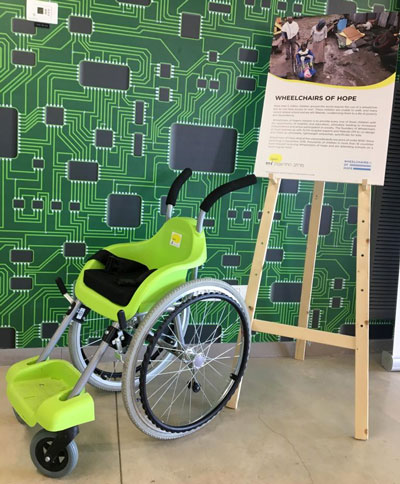
An occupational therapist with 26 years of experience in assistive technology and medical devices, Naomi Gefen has been closely involved in the development of new services for children with disabilities. Following ALYN’s collaboration with Wheelchairs of Hope, the hospital opened a unique innovation space in 2017 to develop new products and technologies aimed for the international market.
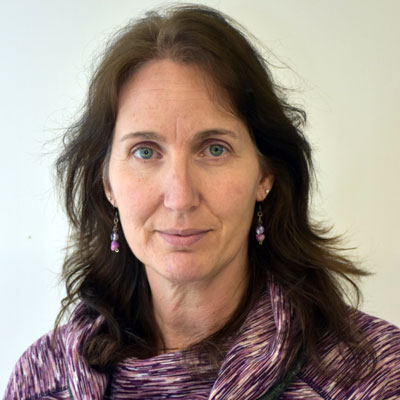
Created in partnership with the National Insurance Social Funds, Jerusalem Development Authority, and the Ministry of Jerusalem and Heritage, the 5,400 square-foot ALYN Innovation space holds several offices, a 3D-printing room, and a biomechanical lab for prototyping and initial manufacturing of solutions.
"The innovation space was based off the work we have been doing for almost 30 years in the hospital’s bio-mechanical lab for internal use," Gefen said. "Under these walls we have an array of everything that an entrepreneur would need to see if their idea was relevant and how to scale it up."
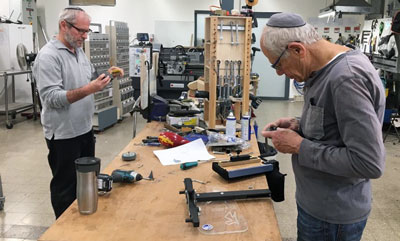
According to a 2018 Market Watch report, the global occupational rehabilitation technology market is expected to grow 5% until 2022, with robotics technology acting as a key driver to growth. However, Gefen said children's needs can sometimes be left behind.
"The design of technology can either be very restrictive for one population or it can be inclusive where you think of one population when building it, but also have in mind others. Technology is usually developed for adults but then when its down sized for children it doesn’t always work as they have different needs. Once you design for a child, the ability to scale it up for adults is actually much easier."
ALYN hospital's innovation space functions as a one-stop shop for entrepreneurs in pediatric rehab tech. "Here, you get the space to work and access to therapists and their specialties. So, for example, if someone comes in with a specific idea then we can bring in a specialized therapist in that subject, and of course we have the kids that you can try the equipment out with and they love being part of it."
The innovation space holds two program tracks to develop technologies – PELE and ALYNnovation. PELE – which stands for "a wonder" in Hebrew, is case-driven and develops customized solutions for children in Israel with physical disabilities. Volunteers lead the design and manufacturing to provide affordable assistive technology.
ALYNnovation acts as a commercial and R&D track to develop technologies with the greatest potential to help disabled children throughout the world. "We are not an accelerator or tech-transfer group," Samantha Soclof, ALYN’s innovation associate, explained. "We are very much part of the hospital, but we work with companies in the realm of rehab and assistive technology to bring clinical expertise in the development of specific products."
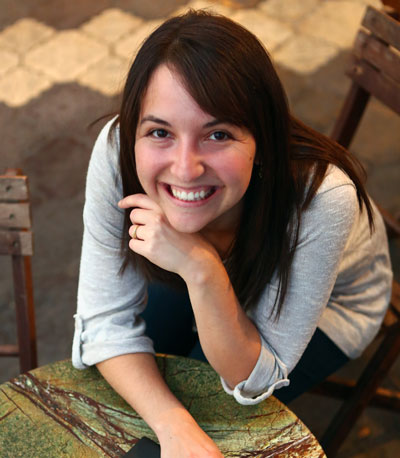
Gaming Innovation
ALYN is already working with nine companies to co-develop solutions to make therapy for children more fun. Examples of their collaboration include big data start-up Playwork, which is digitizing physiotherapy equipment. The Israeli company integrates big data and internet-of-things technology into existing physiotherapy equipment to monitor patient performance and generate data-driven care plans to maximize health-care reimbursement. The company’s flagship product is a digitized physiotherapy ball with sensors that connect to a game that helps children work on range-of-motion and endurance. ALYN expects the ball to have a huge impact on how therapists approach treatment with children.
The facility also recently signed an agreement with Tap With Us, the developer of a wearable keyboard, mouse and controller that allows any surface to be turned into a keyboard. The wearable is worn on the user's hand, sliding over each finger, and uses fingertip gestures to produce different letters and symbols. It can be connected via Bluetooth to any device and then tapping can take place on any surface to type. Although it comes preloaded with a series of gestures, the app is programmable to individual needs, and uses musical and visual cues to help memorize each "tap set."
"Our first target was the visually impaired community and the blind as we thought this is what they really need," Tap With Us engineer Moti Kdoshim said. However, the wearable is now being developed to benefit physically disabled children as it can be programmed to assign different combinations to different keys, a feature useful for children with missing digits.
"If someone only has the thumb or index finger, you have to work on fine motor, not only gross motor," Gefen said. "So part of working with the app could be fine tuning the ability to control these fingers, or whatever is needed. Even though the device was developed for writing, it can be used for other functions."
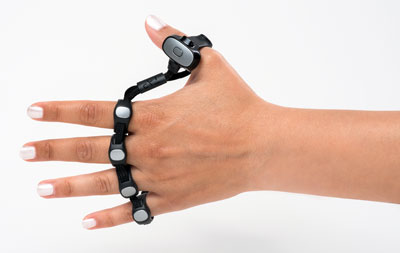
In Alyn’s motion lab, Israeli start-up Senserum is using virtual reality therapy solutions to assist children with movement. The company has designed a sensory, immersive platform for children undergoing physical rehabilitation. Using a VR headset and wearable sensors, the children encounter different game-like challenges that focus on improving the area of gait and mobility. Divided into full body tasks and upper body tasks, the full body tasks include walking, crawling, balancing, dodging and ducking while upper body tasks involve mostly hands eye coordination tasks as well as upper extremities movement.
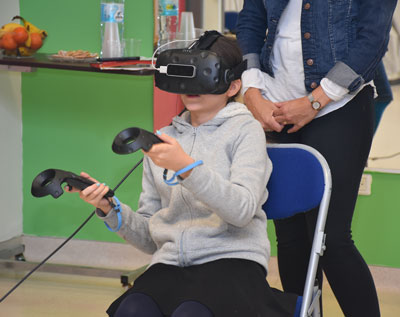
The games are fun for children as they create an interactive and stimulating experience, without them recognizing their physical therapy goals, said Gefen. "We had a child with condition called complex regional pain syndrome (CRPS) and he wasn’t able to put weight on his leg as he was in a lot of pain. When he played with the VR, the pain went away as the game was a total distraction and we were able to show the child, look what we did. So this tool was very beneficial to move the child forward for therapy," said Gefen.
"We’re working with kids to achieve their therapy goals and they want to play so we want them to play so they work on what we want them to work with. So, these solutions are very exciting for us. Everybody wins."
*MiXiii Biomed is Israel’s leading international life science conference and exhibition, held May 14-16 in Tel Aviv. The conference is the main annual meeting place for representatives of Israel’s health-care industry with their colleagues from around the world. This year the conference will expand the scope and range of topics to include prevention and rehabilitation, exploring the full spectrum of health care.
